- Home
- Cory Doctorow
Makers
Makers Read online
Makers
Cory Doctorow
In this tour de force, Doctorow (Little Brother) uses the contradictions of two overused SF themes—the decline and fall of America and the boundless optimism of open source/hacker culture—to draw one of the most brilliant reimaginings of the near future since cyberpunk wore out its mirror shades. Perry Gibbons and Lester Banks, typical brilliant geeks in a garage, are trash-hackers who find inspiration in the growing pile of technical junk. Attracting the attention of suits and smart reporter Suzanne Church, the duo soon get involved with cheap and easy 3D printing, a cure for obesity and crowd-sourced theme parks. The result is bitingly realistic and miraculously avoids cliché or predictability. While dates and details occasionally contradict one another, Doctorow's combination of business strategy, brilliant product ideas and laugh-out-loud moments of insight will keep readers powering through this quick-moving tale.1.0 — создание файла
Makers
Cory Doctorow
Dedication
For “the risk-takers, the doers, the makers of things.”
PART I
Suzanne Church almost never had to bother with the blue blazer these days. Back at the height of the dot-boom, she’d put on her business journalist drag—blazer, blue sailcloth shirt, khaki trousers, loafers—just about every day, putting in her obligatory appearances at splashy press-conferences for high-flying IPOs and mergers. These days, it was mostly work at home or one day a week at the San Jose Mercury News’s office, in comfortable light sweaters with loose necks and loose cotton pants that she could wear straight to yoga after shutting her computer’s lid.
Blue blazer today, and she wasn’t the only one. There was Reedy from the NYT’s Silicon Valley office, and Tribbey from the WSJ, and that despicable rat-toothed jumped-up gossip columnist from one of the UK tech-rags, and many others besides. Old home week, blue blazers fresh from the dry-cleaning bags that had guarded them since the last time the NASDAQ broke 5,000.
The man of the hour was Landon Kettlewell — the kind of outlandish prep-school name that always seemed a little made up to her—the new CEO and front for the majority owners of Kodak/Duracell. The despicable Brit had already started calling them Kodacell. Buying the company was pure Kettlewell: shrewd, weird, and ethical in a twisted way.
“Why the hell have you done this, Landon?” Kettlewell asked himself into his tie-mic. Ties and suits for the new Kodacell execs in the room, like surfers playing dress-up. “Why buy two dinosaurs and stick ’em together? Will they mate and give birth to a new generation of less-endangered dinosaurs?”
He shook his head and walked to a different part of the stage, thumbing a PowerPoint remote that advanced his slide on the jumbotron to a picture of a couple of unhappy cartoon brontos staring desolately at an empty nest. “Probably not. But there is a good case for what we’ve just done, and with your indulgence, I’m going to lay it out for you now.”
“Let’s hope he sticks to the cartoons,” Rat-Toothed hissed beside her. His breath smelled like he’d been gargling turds. He had a not-so-secret crush on her and liked to demonstrate his alpha-maleness by making half-witticisms into her ear. “They’re about his speed.”
She twisted in her seat and pointedly hunched over her computer’s screen, to which she’d taped a thin sheet of polarized plastic that made it opaque to anyone shoulder-surfing her. Being a halfway attractive woman in Silicon Valley was more of a pain in the ass than she’d expected, back when she’d been covering rustbelt shenanigans in Detroit, back when there was an auto industry in Detroit.
The worst part was that the Brit’s reportage was just spleen-filled editorializing on the lack of ethics in the valley’s board-rooms (a favorite subject of hers, which no doubt accounted for his fellow-feeling), and it was also the crux of Kettlewell’s schtick. The spectacle of an exec who talked ethics enraged Rat-Toothed more than the vilest baby-killers. He was the kind of revolutionary who liked his firing squads arranged in a circle.
“I’m not that dumb, folks,” Kettlewell said, provoking a stagey laugh from Mr Rat-Tooth. “Here’s the thing: the market had valued these companies at less than their cash on hand. They have twenty billion in the bank and a 16 billion dollar market-cap. We just made four billion dollars, just by buying up the stock and taking control of the company. We could shut the doors, stick the money in our pockets, and retire.”
Suzanne took notes. She knew all this, but Kettlewell gave good sound-bite, and talked slow in deference to the kind of reporter who preferred a notebook to a recorder. “But we’re not gonna do that.” He hunkered down on his haunches at the edge of the stage, letting his tie dangle, staring spacily at the journalists and analysts. “Kodacell is bigger than that.” He’d read his email that morning then, and seen Rat-Toothed’s new moniker. “Kodacell has goodwill. It has infrastructure. Administrators. Physical plant. Supplier relationships. Distribution and logistics. These companies have a lot of useful plumbing and a lot of priceless reputation.
“What we don’t have is a product. There aren’t enough buyers for batteries or film—or any of the other stuff we make—to occupy or support all that infrastructure. These companies slept through the dot-boom and the dot-bust, trundling along as though none of it mattered. There are parts of these businesses that haven’t changed since the fifties.
“We’re not the only ones. Technology has challenged and killed businesses from every sector. Hell, IBM doesn’t make computers anymore! The very idea of a travel agent is inconceivably weird today! And the record labels, oy, the poor, crazy, suicidal, stupid record labels. Don’t get me started.
“Capitalism is eating itself. The market works, and when it works, it commodifies or obsoletes everything. That’s not to say that there’s no money out there to be had, but the money won’t come from a single, monolithic product line. The days of companies with names like ’General Electric’ and ’General Mills’ and ’General Motors’ are over. The money on the table is like krill: a billion little entrepreneurial opportunities that can be discovered and exploited by smart, creative people.
“We will brute-force the problem-space of capitalism in the twenty first century. Our business plan is simple: we will hire the smartest people we can find and put them in small teams. They will go into the field with funding and communications infrastructure—all that stuff we have left over from the era of batteries and film—behind them, capitalized to find a place to live and work, and a job to do. A business to start. Our company isn’t a project that we pull together on, it’s a network of like-minded, cooperating autonomous teams, all of which are empowered to do whatever they want, provided that it returns something to our coffers. We will explore and exhaust the realm of commercial opportunities, and seek constantly to refine our tactics to mine those opportunities, and fill our hungry belly. This company isn’t a company anymore: this company is a network, an approach, a sensibility.”
Suzanne’s fingers clattered over her keyboard. The Brit chuckled nastily. “Nice talk, considering he just made a hundred thousand people redundant,” he said. Suzanne tried to shut him out: yes, Kettlewell was firing a company’s worth of people, but he was also saving the company itself. The prospectus had a decent severance for all those departing workers, and the ones who’d taken advantage of the company stock-buying plan would find their pensions augmented by whatever this new scheme could rake in. If it worked.
“Mr Kettlewell?” Rat-Toothed had clambered to his hind legs.
“Yes, Freddy?” Freddy was Rat-Toothed’s given name, though Suzanne was hard pressed to ever retain it for more than a few minutes at a time. Kettlewell knew every business-journalist in the Valley by name, though. It was a CEO thing.
“Where will you recruit this new workforce from? And what ki
nd of entrepreneurial things will they be doing to ’exhaust the realm of commercial activities’?”
“Freddy, we don’t have to recruit anyone. They’re beating a path to our door. This is a nation of manic entrepreneurs, the kind of people who’ve been inventing businesses from video arcades to photomats for centuries.” Freddy scowled skeptically, his jumble of grey tombstone teeth protruding. “Come on, Freddy, you ever hear of the Grameen Bank?”
Freddy nodded slowly. “In India, right?”
“Bangladesh. Bankers travel from village to village on foot and by bus, finding small co-ops who need tiny amounts of credit to buy a cellphone or a goat or a loom in order to grow. The bankers make the loans and advise the entrepreneurs, and the payback rate is fifty times higher than the rate at a regular lending institution. They don’t even have a written lending agreement: entrepreneurs—real, hard-working entrepreneurs—you can trust on a handshake.”
“You’re going to help Americans who lost their jobs in your factories buy goats and cellphones?”
“We’re going to give them loans and coordination to start businesses that use information, materials science, commodified software and hardware designs, and creativity to wring a profit from the air around us. Here, catch!” He dug into his suit-jacket and flung a small object toward Freddy, who fumbled it. It fell onto Suzanne’s keyboard.
She picked it up. It looked like a keychain laser-pointer, or maybe a novelty light-saber.
“Switch it on, Suzanne, please, and shine it, oh, on that wall there.” Kettlewell pointed at the upholstered retractable wall that divided the hotel ballroom into two functional spaces.
Suzanne twisted the end and pointed it. A crisp rectangle of green laser-light lit up the wall.
“Now, watch this,” Kettlewell said.
NOW WATCH THIS
The words materialized in the middle of the rectangle on the distant wall.
“Testing one two three,” Kettlewell said.
TESTING ONE TWO THREE
“Donde esta el bano?”
WHERE IS THE BATHROOM
“What is it?” said Suzanne. Her hand wobbled a little and the distant letters danced.
WHAT IS IT
“This is a new artifact designed and executed by five previously out-of-work engineers in Athens, Georgia. They’ve mated a tiny Linux box with some speaker-independent continuous speech recognition software, a free software translation engine that can translate between any of twelve languages, and an extremely high-resolution LCD that blocks out words in the path of the laser-pointer.
“Turn this on, point it at a wall, and start talking. Everything said shows up on the wall, in the language of your choosing, regardless of what language the speaker was speaking.”
All the while, Kettlewell’s words were scrolling by in black block caps on that distant wall: crisp, laser-edged letters.
“This thing wasn’t invented. All the parts necessary to make this go were just lying around. It was assembled. A gal in a garage, her brother the marketing guy, her husband overseeing manufacturing in Belgrade. They needed a couple grand to get it all going, and they’ll need some life-support while they find their natural market.
“They got twenty grand from Kodacell this week. Half of it a loan, half of it equity. And we put them on the payroll, with benefits. They’re part freelancer, part employee, in a team with backing and advice from across the whole business.
“It was easy to do once. We’re going to do it ten thousand times this year. We’re sending out talent scouts, like the artists and representation people the record labels used to use, and they’re going to sign up a lot of these bands for us, and help them to cut records, to start businesses that push out to the edges of business.
“So, Freddy, to answer your question, no, we’re not giving them loans to buy cellphones and goats.”
Kettlewell beamed. Suzanne twisted the laser-pointer off and made ready to toss it back to the stage, but Kettlewell waved her off.
“Keep it,” he said. It was suddenly odd to hear him speak without the text crawl on that distant wall. She put the laser pointer in her pocket and reflected that it had the authentic feel of cool, disposable technology: the kind of thing on its way from a startup’s distant supplier to the schwag bags at high-end technology conferences to blister-packs of six hanging in the impulse aisle at Fry’s.
She tried to imagine the technology conferences she’d been to with the addition of the subtitling and translation and couldn’t do it. Not conferences. Something else. A kids’ toy? A tool for Starbucks-smashing anti-globalists, planning strategy before a WTO riot? She patted her pocket.
Freddy hissed and bubbled like a teakettle beside her, fuming. “What a cock,” he muttered. “Thinks he’s going to hire ten thousand teams to replace his workforce, doesn’t say a word about what that lot is meant to be doing now he’s shitcanned them all. Utter bullshit. Irrational exuberance gone berserk.”
Suzanne had a perverse impulse to turn the wand back on and splash Freddy’s bilious words across the ceiling, and the thought made her giggle. She suppressed it and kept on piling up notes, thinking about the structure of the story she’d file that day.
Kettlewell pulled out some charts and another surfer in a suit came forward to talk money, walking them through the financials. She’d read them already and decided that they were a pretty credible bit of fiction, so she let her mind wander.
She was a hundred miles away when the ballroom doors burst open and the unionized laborers of the former Kodak and the former Duracell poured in on them, tossing literature into the air so that it snowed angry leaflets. They had a big drum and a bugle, and they shook tambourines. The hotel rent-a-cops occasionally darted forward and grabbed a protestor by the arm, but her colleagues would immediately swarm them and pry her loose and drag her back into the body of the demonstration. Freddy grinned and shouted something at Kettlewell, but it was lost in the din. The journalists took a lot of pictures.
Suzanne closed her computer’s lid and snatched a leaflet out of the air. WHAT ABOUT US? it began, and talked about the workers who’d been at Kodak and Duracell for twenty, thirty, even forty years, who had been conspicuously absent from Kettlewell’s stated plans to date.
She twisted the laser-pointer to life and pointed it back at the wall. Leaning in very close, she said, “What are your plans for your existing workforce, Mr Kettlewell?”
WHAT ARE YOUR PLANS FOR YOUR EXISTING WORKFORCE MR KETTLEWELL
She repeated the question several times, refreshing the text so that it scrolled like a stock ticker across that upholstered wall, an illuminated focus that gradually drew all the attention in the room. The protestors saw it and began to laugh, then they read it aloud in ragged unison, until it became a chant: WHAT ARE YOUR PLANS—thump of the big drum—FOR YOUR EXISTING WORKFORCE thump MR thump KETTLEWELL?
Suzanne felt her cheeks warm. Kettlewell was looking at her with something like a smile. She liked him, but that was a personal thing and this was a truth thing. She was a little embarrassed that she had let him finish his spiel without calling him on that obvious question. She felt tricked, somehow. Well, she was making up for it now.
On the stage, the surfer-boys in suits were confabbing, holding their thumbs over their tie-mics. Finally, Kettlewell stepped up and held up his own laser-pointer, painting another rectangle of light beside Suzanne’s.
“I’m glad you asked that, Suzanne,” he said, his voice barely audible.
I’M GLAD YOU ASKED THAT SUZANNE
The journalists chuckled. Even the chanters laughed a little. They quieted down.
“I’ll tell you, there’s a downside to living in this age of wonders: we are moving too fast and outstripping the ability of our institutions to keep pace with the changes in the world.”
Freddy leaned over her shoulder, blowing shit-breath in her ear. “Translation: you’re ass-fucked, the lot of you.”
TRANSLATION YOUR ASS FUCKED THE LOT OF YOU
<
br /> Suzanne yelped as the words appeared on the wall and reflexively swung the pointer around, painting them on the ceiling, the opposite wall, and then, finally, in miniature, on her computer’s lid. She twisted the pointer off.
Freddy had the decency to look slightly embarrassed and he slunk away to the very end of the row of seats, scooting from chair to chair on his narrow butt. On stage, Kettlewell was pretending very hard that he hadn’t seen the profanity, and that he couldn’t hear the jeering from the protestors now, even though it had grown so loud that he could no longer be heard over it. He kept on talking, and the words scrolled over the far wall.
THERE IS NO WORLD IN WHICH KODAK AND DURACELL GO ON MAKING FILM AND BATTERIES
THE COMPANIES HAVE MONEY IN THE BANK BUT IT HEMORRHAGES OUT THE DOOR EVERY DAY
WE ARE MAKING THINGS THAT NO ONE WANTS TO BUY
THIS PLAN INCLUDES A GENEROUS SEVERANCE FOR THOSE STAFFERS WORKING IN THE PARTS OF THE BUSINESS THAT WILL CLOSE DOWN
— Suzanne admired the twisted, long-way-around way of saying, “the people we’re firing.” Pure CEO passive voice. She couldn’t type notes and read off the wall at the same time. She whipped out her little snapshot and monkeyed with it until it was in video mode and then started shooting the ticker.
BUT IF WE ARE TO MAKE GOOD ON THAT SEVERANCE WE NEED TO BE IN BUSINESS
WE NEED TO BE BRINGING IN A PROFIT SO THAT WE CAN MEET OUR OBLIGATIONS TO ALL OUR STAKEHOLDERS SHAREHOLDERS AND WORKFORCE ALIKE
WE CAN’T PAY A PENNY IN SEVERANCE IF WE’RE BANKRUPT
WE ARE HIRING 50000 NEW EMPLOYEES THIS YEAR AND THERE’S NOTHING THAT SAYS THAT THOSE NEW PEOPLE CAN’T COME FROM WITHIN
CURRENT EMPLOYEES WILL BE GIVEN CONSIDERATION BY OUR SCOUTS
ENTREPRENEURSHIP IS A DEEPLY AMERICAN PRACTICE AND OUR WORKERS ARE AS CAPABLE OF ENTREPRENEURIAL ACTION AS ANYONE

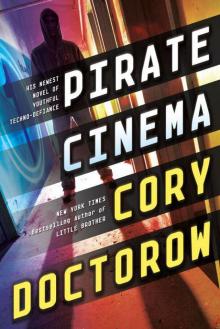 Pirate Cinema
Pirate Cinema Walkaway
Walkaway Little Brother
Little Brother Someone Comes to Town, Someone Leaves Town
Someone Comes to Town, Someone Leaves Town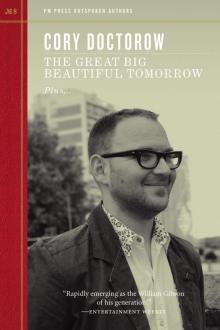 The Great Big Beautiful Tomorrow
The Great Big Beautiful Tomorrow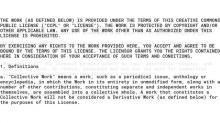 Super Man and the Bug Out
Super Man and the Bug Out For the Win
For the Win A Place so Foreign
A Place so Foreign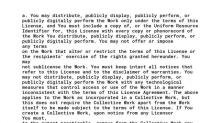 Shadow of the Mothaship
Shadow of the Mothaship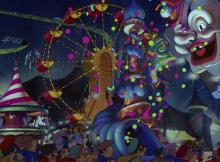 Return to Pleasure Island
Return to Pleasure Island Party Discipline
Party Discipline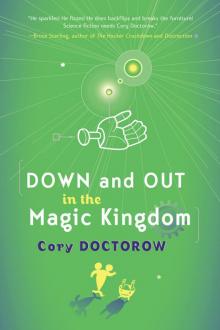 Down and Out in the Magic Kingdom
Down and Out in the Magic Kingdom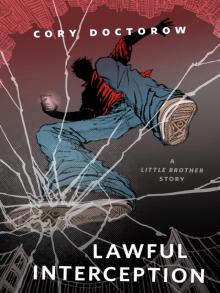 Lawful Interception
Lawful Interception Homeland
Homeland Eastern Standard Tribe
Eastern Standard Tribe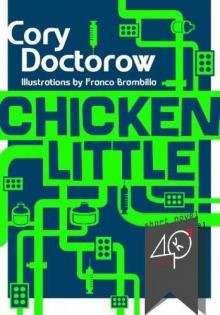 Chicken Little
Chicken Little I, Row-Boat
I, Row-Boat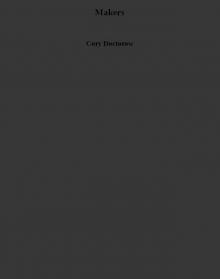 Makers
Makers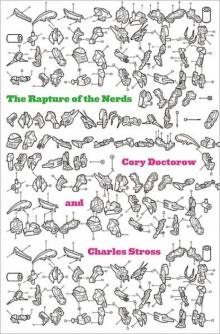 Rapture of the Nerds
Rapture of the Nerds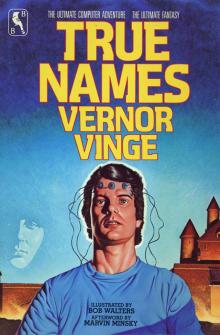 True Names
True Names